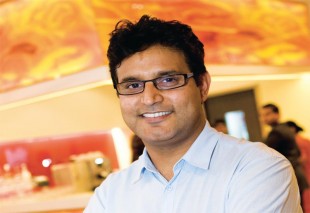

CELEBRITY CHEF INTERVIEW: Atul Kochhar

Acclaimed chef Atul Kochhar explains why it’s modesty over ambition that will take your business to new heights
Atul Kochhar is becoming a firm favourite on the Dubai food scene. Despite having a huge amount of Indian cuisine in the UAE already, he hopes Zafran restaurants, for which he is the face behind and works for on a consultancy basis, will become the new local Indian restaurant.
“I know the UAE is laden with Indian food already,” he admits. “But having worked in Europe, especially in the UK, I can bring new twists to Indian food. There is a massive expat community in the UAE, which relishes the food we do, and I think the Indians are in for a treat too, seeing how we are pushing Indian food forward.”
Back in the UK, Kochhar’s main interest is his London fine-dining restaurant, Benares. He also owns a restaurant in Dublin called Ananda, and one onboard a P&O cruise liner called Sindhu. He is working on his third book, Curries of the World, and regularly appears on television in the UK and all over the world.
But with two Zafran outlets already performing well, and plans for 2012 expansion, Kochhar is now setting his sights on a new market in Dubai.
“I am opening a fine-dining restaurant on Sheikh Zayed Road in the JW Marriott Marquis [opening Q4 2012]. It will be under my name and it will be called Rang Mahal, which means palace full of colours.”
What’s more, Kochhar is confident that it will do well in a saturated market.
“There’s always room for a good restaurant,” he says. “If you do a good job, people will come to you. I think I will add to Dubai’s fine dining scene – I will be adding to the colour, not competing.”
Looking further afield
It’s not just the UAE Kochhar has plans for: “I do want to develop Zafran in the UK in a year or so. That was the original idea and I will go back to it and create it, for sure. The UK is the place where Indian food is biggest outside of India – that quest is there and I’m going to achieve it.
“Back in 2008 I was going to have joint venture with Foodmark,” he explains. “It was to create a similar concept to Zafran in the UK, but we saw the recession coming so fast and furiously we abandoned the project.
“Then six months later we thought, why don’t we start it off in the UAE – not a joint project, but I helped Foodmark set it up and became a bit of a consultant to them. That’s still the arrangement at the moment.”
Making sacrifices
Kochhar is a man with high morals and ethical practices, but he admits he’s had to make sacrifices while working in the UAE.
“In the UK we are working towards a policy of zero wastage. We are coming up with ideas and dishes that produce completely zero waste, and I mean zero.
“I am sorry to see there is so much wastage [in the UAE] – it’s shameful in my opinion. We shouldn’t be throwing any good food into the bin. I recently read about a restaurant in Saudi Arabia that was charging customers if they were leaving their food. It was pushing people to order less, and it was an ingenious policy.
“In the UAE, by following a zero-wastage policy, chefs can cut their costs hard too.”
Taking the plunge
Being such a successful and driven restaurateur, and a natural at the television appearances, Kochhar seems to have fallen into his career. Not the case, he reveals.
“When I chose to become a chef I had an admission letter from a medical school in one hand, and one from a kitchen college in the other. I chose to go to the kitchen college and people called me a fool.
“I was looked down upon by my cousins and uncles because at that time, becoming a successful chef was unheard of. People thought you were just going to become another cook peeling onions and garlic and then you’ll die. It was not thought to be a great profession – there were no chefs who had gone on to open their own restaurants.
“I set out of India thinking ‘I am going to go out around the world, learn from different chefs and see where that takes me’. When I arrived in the UK I found Indian food in tatters and I thought, ‘here’s a mission’, and I got totally engrossed in it, knowing I would make history one day.”
Kochhar hopes that his success will inspire a lot of other chefs from his home country: “I do still believe that India has an amazing amount of talent and there’s so much more to be done with the food. We have literally scratched the surface of it.”
Leading by example
Kochhar also admits its humbleness and modesty that will lead future chefs to great success: “Chefs need to be humble, which they’re not – it’s a difficult thing to be.
They need to recognise that if a restaurant succeeds, it’s because the team has succeeded, not the chef. I bring that message home time and time again and I drill it into chefs that come to me: don’t become big-headed, it’s not required.
If you are calm you will be creative, and create amazing dishes and amazing menus that people will love.”
Kochhar adopts that philosophy himself and admits even as twice Michelin-starred chef, author, TV personality and restaurateur: “I don’t feel like I’m successful.
“I don’t look at [my career] as an achievement. I don’t have a perception of success – it’s a journey for me. There are awards to be taken, but there are failures to be counted. I look back at the great thing but more clearly I see we have a lot more to go for.”